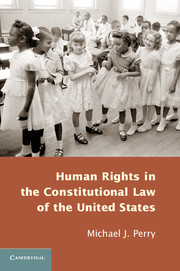Book contents
- Frontmatter
- Dedication
- Contents
- About the Author
- Introduction: Human Rights in the Constitutional Law of the United States
- Part I The Morality of Human Rights
- Part II The Constitutional Morality of the United States
- 4 Capital Punishment
- 5 The Question of Judicial Deference
- 6 The Right to Moral Equality
- 7 The Right to Religious and Moral Freedom
- 8 Same-Sex Marriage
- 9 Abortion
- Concluding Note
- Index
- References
4 - Capital Punishment
Published online by Cambridge University Press: 05 July 2013
- Frontmatter
- Dedication
- Contents
- About the Author
- Introduction: Human Rights in the Constitutional Law of the United States
- Part I The Morality of Human Rights
- Part II The Constitutional Morality of the United States
- 4 Capital Punishment
- 5 The Question of Judicial Deference
- 6 The Right to Moral Equality
- 7 The Right to Religious and Moral Freedom
- 8 Same-Sex Marriage
- 9 Abortion
- Concluding Note
- Index
- References
Summary
The right not to be subjected by government to any punishment (or other treatment) that is “cruel, inhuman or degrading” is internationally recognized as a human right. A version of that right is entrenched in the constitutional law of the United States – and is therefore part of the constitutional morality of the United States: the right not to be subjected by government, federal or state, to any punishment that is “cruel and unusual.”
That the right not to be subjected by government to “cruel, inhuman or degrading” punishment is internationally recognized as a human right could not be clearer:
Article 5 of the Universal Declaration of Human Rights (1948): “No one shall be subjected to torture or to cruel, inhuman or degrading treatment or punishment.”
Article 7 of the International Covenant on Civil and Political Rights (1976): “No one shall be subjected to torture or to cruel, inhuman or degrading treatment or punishment.” As of December 2012, there were 167 State Parties to the International Covenant, including, as of 1992, the United States.
Article 3 of the European Convention for the Protection of Human Rights and Fundamental Freedoms (1953): “No one shall be subjected to torture or to inhuman or degrading treatment or punishment.”
Article 5(2) of the American Convention on Human Rights (1978): “No one shall be subjected to torture or to cruel, inhuman, or degrading punishment or treatment.”
Article 5 of the African Charter on Human and People's Rights (1986): “Every individual shall have the right to the respect of the dignity inherent in a human being and to the recognition of his legal status. All forms of exploitation and degradation of man particularly slavery, slave trade, torture, cruel, inhuman or degrading punishment and treatment shall be prohibited.”
- Type
- Chapter
- Information
- Publisher: Cambridge University PressPrint publication year: 2013



